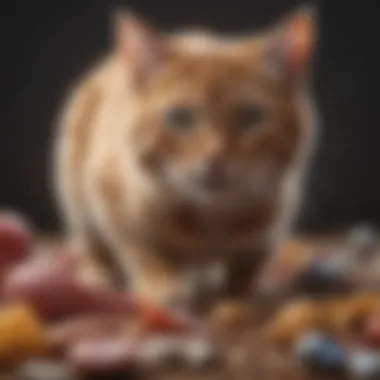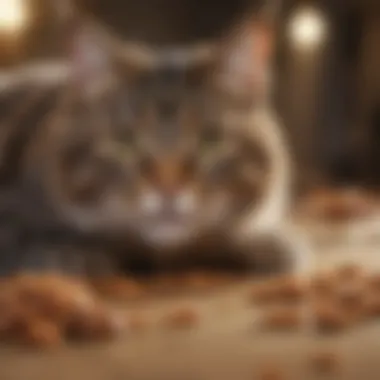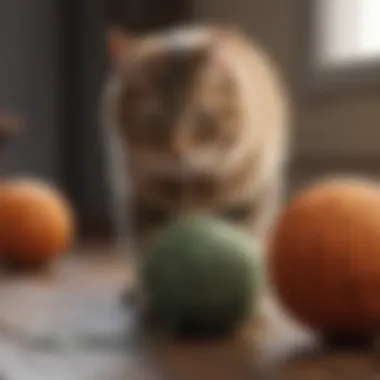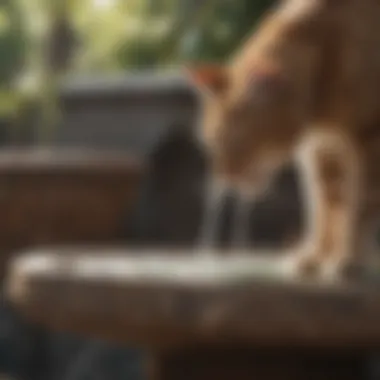Understanding the Problem of Soft Stools in Cats and Effective Solutions


Pet Care Essentials
Soft stools in cats can be a concerning issue for pet owners. Understanding the daily nutrition requirements of your feline friend is crucial to addressing this issue. A balanced diet rich in proteins, fibers, and essential nutrients plays a pivotal role in maintaining digestive health and stool consistency. Ensuring that your cat receives adequate hydration is also essential, as water intake directly impacts stool firmness. Regular meals, portion control, and avoiding sudden dietary changes can help in regulating your cat's digestive system. Monitoring your cat's food intake and observing any changes in eating habits can provide valuable insights into their digestive health.
Exercise and Playtime
Alongside nutrition, engaging your cat in regular exercise and playtime is vital for their overall well-being. Physical activity not only promotes a healthy weight but also stimulates bowel movement, which can aid in managing soft stools. Interactive toys, climbing structures, and dedicated play sessions help cats burn excess energy, combat stress, and maintain optimal digestive function. Encouraging your cat to be active through incentive-based activities can improve their overall health and potentially alleviate issues with soft stools.
Grooming Tips
Proper grooming practices contribute significantly to a cat's health, including their digestive system. Regular grooming helps prevent ingesting excessive fur during self-cleaning, which can sometimes lead to digestive disturbances. Brushing your cat's coat regularly, especially for long-haired breeds, reduces the likelihood of hairballs and other gastrointestinal issues. Additionally, maintaining clean litter boxes and providing a stress-free grooming environment can positively impact your cat's digestive comfort and overall well-being.
Health and Wellness Check-ins
Scheduled health and wellness check-ins with your veterinarian are fundamental in monitoring your cat's digestive health and addressing any underlying issues contributing to soft stools. Regular veterinary examinations allow early detection of potential health concerns, enabling prompt intervention and treatment. Discussing your cat's diet, exercise routine, and any observed changes in stool consistency with your vet can provide valuable guidance on improving digestive health. Routine check-ups are key in ensuring your cat's overall wellness and preventing potential complications related to digestive issues.
Introduction
Soft stools in cats is a prevalent issue that many pet owners face, often causing concern and requiring prompt attention. Understanding the underlying reasons for this condition is crucial in ensuring the well-being of our feline companions. This article embarks on a comprehensive exploration of the causes, signs, diagnostic methods, management strategies, and preventive measures related to soft stools in cats. By shedding light on this topic, we aim to equip pet owners with the knowledge and tools necessary to address this problem effectively. This dedication to delving into the intricacies of feline digestive health not only benefits the cats themselves but also enhances the overall pet ownership experience. By being attuned to the potential factors contributing to soft stools, pet owners can proactively safeguard their pet's health and mitigate any discomfort or complications arising from this issue. Furthermore, a thorough comprehension of soft stools in cats can lead to better decision-making regarding dietary choices, lifestyle adjustments, and veterinary care, thereby promoting the longevity and vitality of our beloved pets. In the following sections, we will unravel the multifaceted aspects of this topic, from the primary triggers of soft stools to the practical steps involved in diagnosis, treatment, and prevention. By engaging with this guide, readers will gain valuable insights into caring for their feline friends and fostering a harmonious bond based on attentive, informed pet parenthood.
Understanding Soft Stools in Cats
Understanding soft stools in cats is a crucial aspect to address in veterinary medicine. The prevalence of soft stools in felines can indicate underlying health issues that require attention. By delving into the causes and symptoms of this condition, veterinarians and pet owners can better understand how to improve the quality of life for their beloved cats. Soft stools may result from various factors, including dietary components, digestive problems, and parasitic infections; therefore, a comprehensive understanding is essential to formulate an effective treatment plan.


Causes of Soft Stools
Dietary Factors
Diet plays a significant role in the development of soft stools in cats. Mismanagement of diet, such as excessive consumption of certain food types or intolerance to specific ingredients, can lead to gastrointestinal upset in felines. Understanding the impact of dietary factors on stool consistency is pivotal in addressing soft stool issues. A balanced diet tailored to meet the nutritional needs of cats is crucial to maintaining optimal digestive health. While dietary factors can influence stool quality positively, an imbalanced diet may result in digestive disturbances that manifest as soft stools. Therefore, addressing dietary components is fundamental in managing soft stools in cats.
Digestive Issues
Digestive issues encompass a broad range of conditions that can contribute to the development of soft stools in cats. From inflammatory bowel disease to bacterial overgrowth, disruptions in the digestive process can lead to irregular stool consistency. Recognizing the signs of digestive disturbances and investigating underlying causes are essential steps in addressing soft stools related to digestive issues. Implementing dietary modifications and therapeutic interventions tailored to support digestive health can aid in alleviating soft stool symptoms associated with digestive issues.
Parasitic Infections
Parasitic infections pose a significant threat to feline health and can result in soft stools among other symptoms. Parasites such as worms and protozoa can disrupt the gastrointestinal tract, leading to malabsorption issues and diarrhea. Identifying and treating parasitic infections promptly is crucial in mitigating the impact on a cat's digestive system. By understanding the transmission and clinical manifestations of parasitic infections, veterinarians can implement targeted treatment strategies to manage soft stools in cats.
Diagnosing Soft Stools in Cats
Veterinary Examination
The initial phase in diagnosing soft stools in cats involves a thorough veterinary examination. This step is essential as it allows a trained professional to assess the cat's overall health, evaluate potential physical abnormalities, and identify any concerning symptoms. From inspecting the cat's body condition to palpating the abdomen for tenderness or masses, a veterinary examination plays a crucial role in gathering vital information to guide further diagnostic procedures.
Diagnostic Tests
Fecal Analysis
Delving deeper into the diagnostic process, fecal analysis emerges as a fundamental tool in evaluating the digestive health of cats. Through the examination of fecal samples, veterinarians can identify the presence of parasites, detect abnormalities in the stool consistency, and determine if there are any signs of gastrointestinal issues. Fecal analysis aids in confirming suspicions regarding the digestive tract and provides valuable insights into the potential causes of soft stools, guiding the course of treatment.


Blood Tests
Complementing fecal analysis, blood tests stand as a valuable diagnostic approach in investigating soft stools in cats. Blood tests allow veterinarians to assess various parameters such as liver and kidney function, blood cell counts, and indicators of infections or inflammations. By analyzing blood samples, veterinarians can gain a comprehensive understanding of the cat's overall health status and uncover any underlying systemic issues that may contribute to the presence of soft stools.
Imaging Studies
Moreover, imaging studies play a significant role in diagnosing soft stools in cats, particularly when internal abnormalities or structural anomalies are suspected. Techniques like x-rays and ultrasounds enable veterinarians to visualize the internal organs, assess the gastrointestinal tract, and identify any obstructions or irregularities. Imaging studies offer valuable insights into the physical condition of the cat's digestive system, aiding in the accurate diagnosis of underlying issues causing soft stools.
Managing Soft Stools in Cats
Managing soft stools in cats is a critical aspect of feline care, aiming to address this common issue effectively. When faced with soft stools in cats, pet owners must understand the importance of timely intervention and appropriate management strategies. By focusing on managing soft stools, one can significantly improve the overall health and well-being of their feline companions. Considerations such as nutrition, hydration, and medication play key roles in achieving optimal outcomes when managing soft stools in cats.
Nutritional Interventions
High-Quality Diet
High-quality diet is a cornerstone of managing soft stools in cats. A high-quality diet ensures that cats receive essential nutrients in the right balance, promoting digestive health and overall well-being. The key characteristic of a high-quality diet lies in its nutrient density and digestibility. Such diets are often rich in protein, vitamins, and minerals, supporting various bodily functions. Pet owners opt for high-quality diets due to their superior nutritional content, which aids in resolving gastrointestinal issues efficiently. Additionally, the unique feature of high-quality diets is their compliance with feline dietary requirements, minimizing the risk of nutritional deficiencies and digestive upsets.
Fiber Supplements
Fiber supplements play a vital role in managing soft stools in cats. These supplements contribute to maintaining gastrointestinal health by regulating bowel movements and promoting stool consistency. The key characteristic of fiber supplements is their ability to add bulk to the stool, aiding in normalizing bowel function. Pet owners choose fiber supplements for their beneficial impact on digestive regularity and stool quality. The unique feature of fiber supplements is their versatility, as they can be easily incorporated into the cat's diet. However, it's essential to monitor the cat's response to fiber supplements to avoid potential digestive issues.
Hydration and Water Intake


Medication and Therapies
Probiotics
Probiotics offer a proactive approach to managing soft stools in cats. These beneficial bacteria contribute to gut health by restoring the natural balance of intestinal flora. The key characteristic of probiotics is their ability to support digestion and boost the immune system. Pet owners favor probiotics for their positive impact on gastrointestinal function and overall well-being. The unique feature of probiotics is their ability to enhance nutrient absorption and reduce digestive disturbances efficiently.
Anti-diarrheal Medications
Anti-diarrheal medications are instrumental in managing soft stools in cats when other interventions have not yielded desired results. These medications help in controlling diarrhea episodes and improving stool consistency. The key characteristic of anti-diarrheal medications is their fast-acting nature in alleviating gastrointestinal distress. Pet owners opt for these medications for their effectiveness in addressing acute digestive issues. The unique feature of anti-diarrheal medications is their ability to provide symptomatic relief while the underlying cause is being addressed, ensuring the cat's comfort and well-being.
Preventing Soft Stools in Casts
Preventing soft stools in cats is a crucial facet of feline health management, encompassing a myriad of beneficial practices to uphold the well-being of our beloved feline companions. The significance of this topic lies in its potential to avert discomfort and health complications for cats, promoting their vitality and longevity. By delving into preventive measures proactively, pet owners can mitigate the risks associated with digestive issues and enhance the overall quality of life for their furry friends.
Healthy Lifestyle Practices
Regular Excercise
Dive into the realm of regular exercise, an indispensable component in the prevention of soft stools in cats, ensuring optimal physical and mental well-being for our feline companions. Regular exercise stands out as a cornerstone in maintaining a healthy weight, promoting efficient digestion, and fostering psychological contentment in cats. This routine physical activity aids in boosting metabolism, enhancing muscle tone, and reducing the likelihood of obesity-related ailments. The consistent engagement in regular exercise not only fortifies the bond between pet and owner but also fosters a sense of fulfillment and vitality in our animal companions.
Stress Management
Exploring the realm of stress management unveils a crucial aspect of cat care, shedding light on the profound impact of psychological well-being on digestive health. Stress management strategies play a pivotal role in mitigating the effects of anxiety and tension, common culprits in the development of soft stools in cats. By implementing stress-alleviating techniques such as environmental enrichment, peaceful sanctuaries, and soothing interactions, pet owners can create a harmonious and tranquil living environment for their feline friends. The meticulous attention to stress management not only fosters digestive stability but also nurtures a serene and nurturing atmosphere for our cherished companions.
Routine Veterinary Care
Delving into the realm of routine veterinary care unveils a fundamental pillar in fortifying the health and resilience of our feline companions. Regular veterinary check-ups stand as an essential conduit to preemptive care, enabling early detection of potential health concerns and proactive intervention. Through routine examinations, vaccinations, and wellness assessments, veterinarians can provide invaluable insights into the overall well-being of cats, empowering pet owners to make informed decisions regarding their care. The diligent pursuit of routine veterinary care serves as a safeguard against a multitude of health challenges, ensuring the longevity and vitality of our beloved feline companions.
Conclusion
Soft stools in cats can be a troubling issue that pet owners must address promptly to ensure the well-being of their feline companions. By addressing the underlying causes and implementing appropriate interventions, owners can improve their cat's digestive health and overall quality of life. Through a combination of dietary modifications, hydration strategies, and potential medication, the management of soft stools in cats becomes a feasible task for responsible pet caregivers. It is crucial for pet owners to prioritize preventive measures as well, such as encouraging healthy lifestyle practices and ensuring regular veterinary check-ups. This holistic approach not only resolves immediate concerns but also serves as a proactive measure in maintaining the long-term health and happiness of beloved feline friends.







